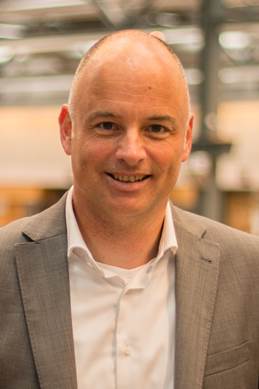Roland Ortt endowed professor Urban Innovation Management
Dr Roland Ortt is appointed endowed professor in Urban Innovation Management at Erasmus University Rotterdam as of 1 May 2022. This is a part-time appointment. Real change in a city requires a combination of new policies, new behavioural patterns of interest groups and new business models of involved companies and organisations. How can these different types of innovations be combined in practice? This is one of the central questions of this chair, which has been established by the Netherlands Study Centre for Technology Trends (STT) and will be embedded in the Leiden-Delft-Erasmus Centre for BOLD Cities.
The objective of the chair of 'Urban Innovation Management' is to gain more insight into the innovation processes in an urban environment in order to strengthen innovations in cities with by contributing knowledge. This is necessary because a strong growth in the number of citizens living in cities is creating problems, such as congestion, pollution, segregation and crime, that require innovative solutions. "I strive for a strong interconnection between research and education. Students and other researchers will participate in research into historical innovation processes and will also participate in ongoing innovation processes." says Roland Ortt.

Professor Karel Luyben, chairman of STT and former rector of TU Delft, is pleased with the chair and the appointment: "As a knowledge and expertise centre for future studies and methodology development, we find it very important to maintain close ties with the research world. In addition to the foresight studies that we disseminate ourselves, we are also keen to support scientific research. The urban environment is an important theme for us, all the more so because several cities are affiliated to the STT."
Historical insight for new innovation
Ortt begins by looking at how an innovation process works: "The starting point is that innovation involves several processes, each with their own timeline. Innovation is in fact a combination of short-term projects that together set in motion a long-term pattern of technology development and diffusion.”
The next step is to identify the relevant stakeholders, factors and mechanisms that determine the course and outcome of innovation processes. "Technological innovation does not come about in isolation. Real change in a city requires a combination of new policies, (institutional innovation), new patterns of behaviour of stakeholders (social innovation) and new business models (business model innovation) of companies and organisations involved." Then the question is "How can these different types of innovations be combined in practice?."
Finally, Ortt wants to find out what the possibilities are for municipalities to stimulate innovation, to adjust it or to respond to it. Ortt: "I want to find out what the vision is and what the goals are of cities with regard to innovation. In order to show what possibilities the various authorities have for managing innovation processes.
Collaboration
The chair is a collaboration between the Netherlands Study Centre for Technology Trends (STT), the Leiden-Delft-Erasmus (LDE) institute BOLD Cities and various cities in the Rijnmond and South Holland region.
"For BOLD Cities, the chair means a further anchoring of the cooperation with partners who work in the field and a deepening of the scientific research on urban innovation. The appointment of Roland Ortt will further develop our research on the management of new urban technologies, and bring our students closer to actual practice," says professor Liesbet van Zoonen, Academic Director of BOLD Cities.
About Roland Ortt
Dr. Roland J. Ortt (1964) is associate professor of technology and innovation management at the Faculty of Engineering and Management of Delft University of Technology. Previously, he worked as an R&D manager for a telecommunications company. He has published in the Journal of Product Innovation Management, the Market Research Society and the International Journal of Technology Management. His research focuses on the development and diffusion of technologies, and on niche strategies to commercialise high-tech systems. Roland works with the Future of Technology Foundation, is dean of the European NiTiM network of researchers in innovation and technology management and is a member of the board of the ICE conference, the IAMOT conference and of the editorial board of Transactions on Engineering Management.
The chair of Urban Innovation Management is housed at the Erasmus School of Social and Behavioural Sciences and at the LDE centre BOLD Cities.